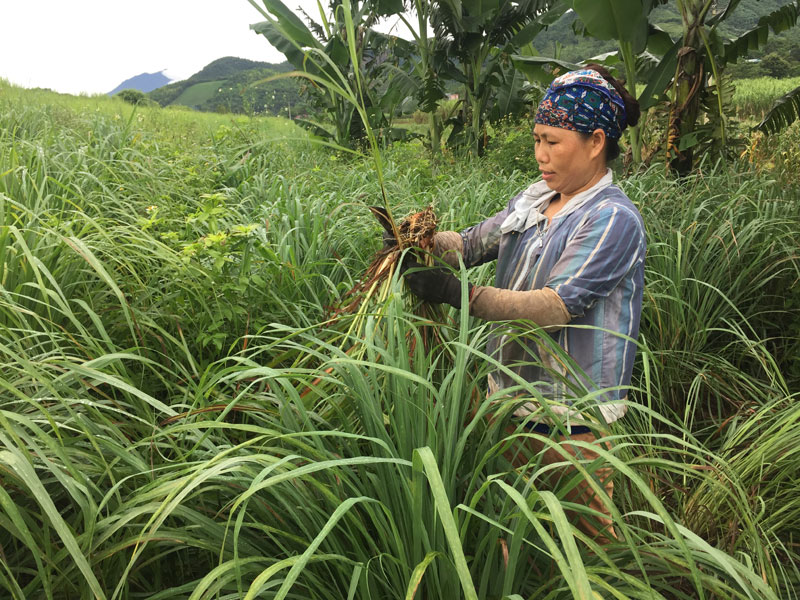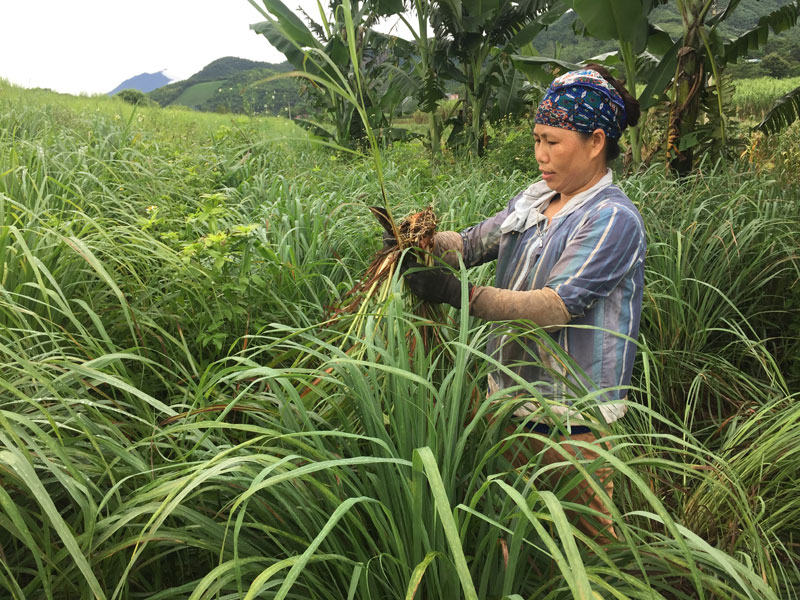
(HBO) - where there is vacant land, there is lemongrass. Up to now, lemongrass is not the key crop to help people in Phuc Tien commune (Ky Son) get rich. However, lemongrass has helped people improve their income much. This is the confirmation of Mr. Nguyen Cuong Bien, the Vice Chairman of Phuc Tien Commune People's Committee when sharing about local models of planting lemongrass in the local area.

Ms. Dinh Thi Lan’s family in Doan Ket 2
village, Phuc Tien Commune (Ky Son) has improved their income thanks to
planting lemongrass.
As far as being concern, lemongrass was
planted by some households in the commune from 1997 or 1998. This is a healthy plant, which
requires little care and it is suitable for local climate and soil. In recent
years, the price of lemongrass ranged from 5,000 to 7,000 VND / kg. However, at
the time of before Tet traditional occasion, it can be up to 12,000 VND / kg.
Therefore, in recent years, many households have made use of garden land,
converting land for lemongrass cultivation in hopes of raising their income.
According to statistics, the area of lemongrass plantation in the commune has
expanded to 80 hectares. Most households maintain the area of between 2,000 and
5,000 square meters. However, some households have expanded the area to nearly
2 hectares, such as the families of Mr. Dinh Manh Huong, Mr. Dinh Cong Phon in
Doan Ket 1village, etc.
We visited Mr. Dinh Manh Huong's family in
Doan Ket 1 Village. At present, the area of lemongrass planting of Mr.
Huong’s family expanded to 1.4 hectares. In 2017, his family exported 7 tons of
lemongrass to the market, earning over 70 million VND. Mr. Huong said: My
family has planted lemongrass for 5-6 years. In my opinion, this is a suitable
variety for our local land. Although growers do not take too much care, they
still collect products throughout the year. If they know how to exploit
correctly, 1 hectare of lemongrass can bring the profit of more than 100
million VND per year. Meanwhile, with the same area, the growers can only gain
about 60 million VND after deducting costs if they plant rice.
Ms. Dinh Thi Lan, in Doan Ket 2 village,
said: "The economy of my family is mainly based on agricultural
production. However, when realizing the economic effect of lemongrass, the family
has converted about 700 m2 of land from growing rice to lemongrass. When the
farmers are crop free, the members of the family focus on harvesting
lemongrass, it is estimated that each person can earn about 250,000 VND per
day. In comparison with growing sugarcane, growing lemongrass is less
hardworking but more profitable.
According to data from the Hoa Binh Provincial Party Committee, the industrial production index for the first six months of 2025 is estimated to have increased by 20% compared to the same period last year. This marks the highest year-on-year growth rate for this period since 2020.
In the first six months of 2025, Hoa Binh province’s export turnover was estimated at 1.145 billion USD, marking an 18.11% increase compared to the same period in 2024. Import turnover was estimated at $ 804 million, a 17.15% increase, which helped the province maintain a positive trade balance.
The lives of the ethnic minority farmers in Tan Lac district have gradually improved thanks to the new directions in agricultural production. This is a testament to the collective strength fostered through the professional associations and groups implemented by various levels of the district’s Farmers’ Union.
With the motto the "product quality comes first,” after nearly one year of establishment and operation, Muong village’s Clean Food Agricultural and Commercial Cooperative, located in Cau Hamlet, Hung Son Commune (Kim Boi district), has launched reputable, high-quality agricultural products to the market that are well-received by consumers. The products such as Muong village’s pork sausage, salt-cured chicken, and salt-cured pork hocks have gradually carved out a place in the market and they are on the path to obtaining the OCOP certification.
In the past, the phrase "bumper harvest, rock-bottom prices" was a familiar refrain for Vietnamese farmers engaged in fragmented, small-scale agriculture. But today, a new spirit is emerging across rural areas of Hoa Binh province - one of collaboration, organisation, and collective economic models that provide a stable foundation for production.
Maintaining growing area codes and packing facility codes in accordance with regulations is a mandatory requirement for agricultural products to be eligible for export. Recently, the Department of Agriculture and Environment of Hoa Binh province has intensified technical supervision of designated farming areas and packing facilities to safeguard the "green passport" that enables its products to access international markets.



